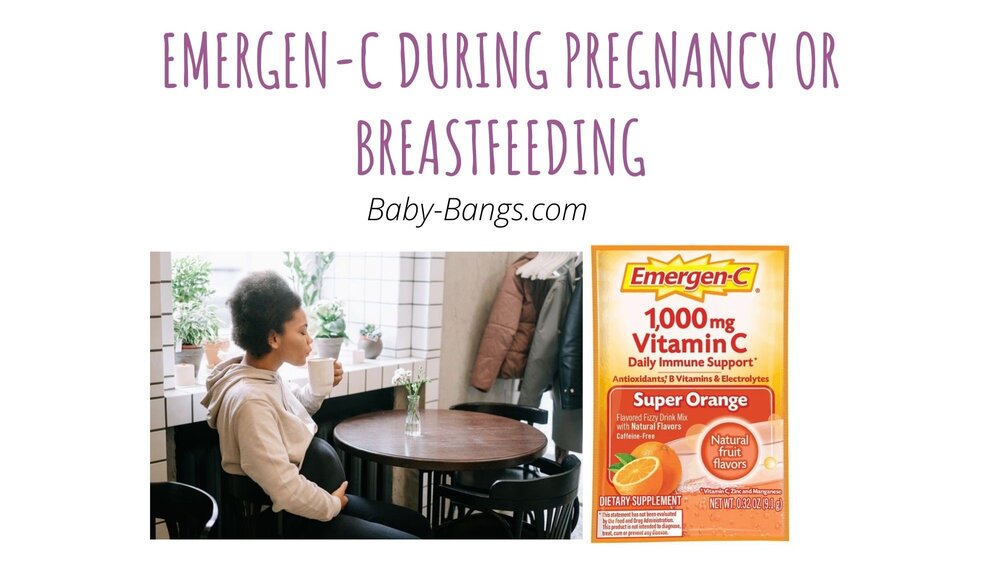
Motherhood is driven by the constant urge to secure the best for the child. And this psychology, in particular, sometimes entices the mothers to be on extra supplements and multivitamins.
In the realm of multivitamins and dietary supplements, no doubt Emergen- C is a prominent name and is widely celebrated among pregnant and lactating mothers.
But recently, a debate took the internet in storms, “whether Emergen-C is safe for pregnant and breastfeeding mothers”. As Researches on pregnant and lactating mothers is not ethically logical, there is minimal data regarding this debate.
While being pregnant, I did in-depth research as I was prescribed to take dietary supplements and explored some shocking facts. And couldn’t help sharing the detailed knowledge with all the would-be and newbie mothers.
In this content, I have outlined
- The basic information about Emergen-C
- Both benefits and downsides of Emergen-C during breastfeeding and pregnancy
- And Final recommendation (Based on facts and references)
The Basics: What Is Emergen-C?
This supplement is widely used to boost immunity and cure a cold, flu, and other types of mild viruses in the initial stage. The main ingredient is no wonder a potent form of Vitamin C accompanied with other nutrients.
Emergen- C comes in different forms; water-soluble powder, gummies, shots. There are multiple flavors as well; orange, acai berry, coconut pineapple, raspberry, lemon-lime. Each serving has 1000 mg of Vitamin C, which is undoubtedly quite strong and is equivalent to almost 10 oranges.
Emergen-C during Pregnancy: Essential or Optional?

Emergen-C is a brand that claims immense health benefits for pregnant women, yet for better assurance, let’s sketch a brief discussion on both the benefits and Sid effects of Emergen-C on an expectant mom.
Benefits of Consuming Emergen-C during Pregnancy
- It is an excellent option for pregnant women who suffer from vitamin deficiency. Emergen-C is formulated with other vitamins and nutrients. Expectant mothers are often medicated to include different vitamins, minerals and antioxidants. Emergen-C can alone serve different nutrient needs.
- Emergen-C helps absorb iron in the body; an appropriate amount of iron in a pregnancy diet increases blood volume and prevents anaemia. Moreover, iron ensures overall growth for the child in the womb.
- This water-soluble multivitamin acts as antioxidants and minimizes the risks of cardiovascular diseases and certain types of cancers among pregnant women.
- Emergen-C also boosts the production of collagen and aids viral fever, cold, and flu. It also promotes bone density among babies.
- Moreover, as vitamin c is the key ingredient, this supplement enhances the pregnancy glow. We all know how beneficial vitamin C is for the skin.
Side effects (probable) of Emergen-C during Pregnancy
- Overdose of Emergen- C can lead to diarrhea, nausea, and fatigue.
Final Suggestion
There is minimal data regarding Vitamin C intake during pregnancy, and there are also mixed results (both positive and negative). As Emergen-C does not only include vitamin C and is backed by other nutritional ingredients, it is most likely to be safe if handled correctly. That means an adequate intake would be harmless and possibly bring benefits.
Emergen-C While Breastfeeding: Let’s Dig Deep Into the Facts
As per the research by Ruth A. Lawrence and Robert M. Lawrence (2015), the intake of vitamin C of the mothers determines the amount of vitamin C present in breastmilk.
To explore more about the effects and drawbacks of Emergen-C during breastfeeding, follow the segments below.
Advantages of Emergen-C during Breastfeeding
- Emergen-C could be the best source for mothers to pass vitamin C to their children through breastmilk. It enhances the skeletal structure of the baby and also prevents many other health issues.
- Emergen-C works against viral fever and cold, and it can substitute aggressive medicines when a mother is nursing. As a result, the child won’tareexposed to high-dose medications.
- As the formula includes probiotics also, Emergen-C is excellent for overall digestion and healthy bowel movements.
- For mothers who lack in producing breastmilk in a certain amount, Emergen-C can be helpful. It is considered to increase the breastmilk volume (though there is limited research regarding this fact).
Drawbacks
- Excessive intake of Emergen-C hardly affects the baby but can cause harm to the mother. Depression, loss of vision, weakness, bleeding gum, these are some of the primary drawbacks of excessive Emergen-C intake.
Final Suggestion
As per the Drugs and Lactation Database, the regular intake (1000 mg) of Vitamin C influence the vitamin C levels in breastmilk but is less likely to cause any harm. Moreover, Vitamin C during breastfeeding is way safer than in pregnancy. But excess consumption of vitamin C can also accelerate milk production (which can be problematic for those who already have overproduction). So, Emergen-C during breastfeeding is quite safe (at least more than during pregnancy), yet the consumption should be limited.
Related: Baby isn’t Babbling yet? Things to Know Before Panicking
Final Recommendation
As pregnancy hits a woman, there occurs restrictions and new guidelines, and in this modern era with way too many options, some are on supplements like Ensure, Gentle Ease, some are doing weight watchers. All in all, it has become a crazy ride for pregnant women to find out what is right.
To call off the discussion, I have created a table that shows the amount per serving in the ingredients of Emergen-C and RDA certified amount during lactation and pregnancy. So, readers will be crystal clear whether Emergen-C is safe or not.
| Ingredients | Amount in Emergen-C | Daily Recommendation for Pregnancy | Daily Recommendation for Lactation | Highest Intake Limit |
| Vitamin C | 1000 mg | 85 mg | 120 mg | 2000 mg |
| Vitamin D | 25 mcg | 15 mcg | Not Available | 100 mg |
| Riboflavin (Vitamin B2) | .43 mg | 1.4 mg | 1.4 mg | 27 mg |
| Thiamin (Vitamin B1) | .38 mg | 1.4 mg | 1.4 mg | Not Available |
| Niacin (Vitamin B3) | 4 mg | 18 mg | 35 mg | 35 mg |
| Folate (Vitamin B9) | 167 mcg DFE | 600 mcg DFE | 500 mcg | 1000 mcg DFE |
| Vitamin B6 | 10 mg | 1.9 mg | 2 mg | 100 mg |
| Vitamin B12 | 25 mcg | 2.6 mg | 2.8 mcg | 500 – 1000 mcg |
| Manganese | .5 mg | 2 mg | 2.6 mg | 11 mg |
| Phosphorous | 38 mg | 700 mg | 700 mg | 3500 mg |
| Calcium | 50 mg | 1000 mg | 1300 mg | 2500 mg |
| Zinc | 10 mg | 11 mg | 12 mg | 40 mg |
| Chromium | 10 mcg | 30 mg | 45 mcg | 1000 mcg |
| Potassium | 200 mg | 2900 mg | 2800 mg | Not Available |
| Sodium | 70 mg | 1500 mg | 1500 mg | Not Available |
Now, from the table, the main ingredient vitamin C and Vitamin B12 is higher in quantity. Though the daily upper limit is 2000 mg, so it is safe to take 1000 mg a day in normal cases. According to the research by Sauberon, 2019, a little higher dose of vitamins does not affect breastfeeding mothers or babies.
Conclusion
Though, as per the reports, Emergen-C intake during pregnancy or breastfeeding is not harmful at all, excessive overdose can cause disaster. And every human body is different; thus, always consult a doctor before taking supplements.
Also read:
- Can you Eat Over Easy Eggs or Eggs Benedict while Pregnant?
- Best 10 Twin Pregnancy Blogs While Expecting a Baby
- Best Protein Powders for Pregnancy
- High Fiber Foods for Pregnancy
- Is 6 pm too early for 2 or 8 months of old bedtime?
Reference